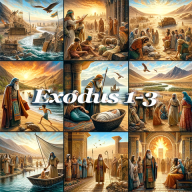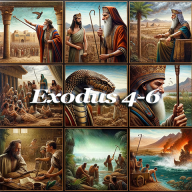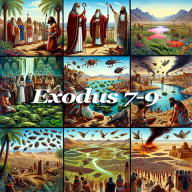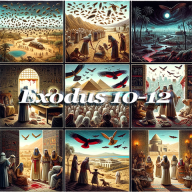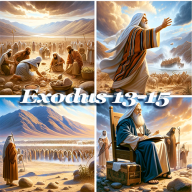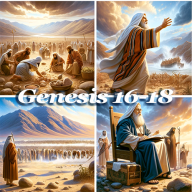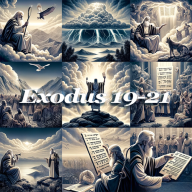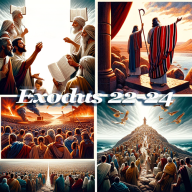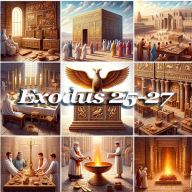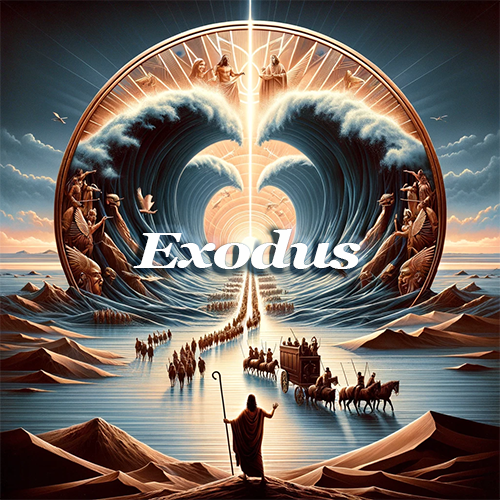 The Book of Exodus, the second book of the Hebrew Bible and the Old Testament, is a seminal text that recounts the story of the Israelites' departure from Egypt, their journey through the wilderness, the giving of the Torah at Mount Sinai, and the construction of the Tabernacle. Its name, "Exodus," originates from the Greek "Exodos," meaning "departure" or "going out," reflecting the central event of the Israelite's escape from Egyptian bondage under the leadership of Moses.
The Book of Exodus, the second book of the Hebrew Bible and the Old Testament, is a seminal text that recounts the story of the Israelites' departure from Egypt, their journey through the wilderness, the giving of the Torah at Mount Sinai, and the construction of the Tabernacle. Its name, "Exodus," originates from the Greek "Exodos," meaning "departure" or "going out," reflecting the central event of the Israelite's escape from Egyptian bondage under the leadership of Moses.
Origin and Name: The title "Exodus" is derived from the Septuagint, the Greek translation of the Hebrew Bible, highlighting the book's focus on the Israelites' departure from Egypt. This theme of liberation and journey is central to both Jewish and Christian traditions, symbolizing God's deliverance and the establishment of a covenant community (Freedman, 1999).
Authorship: Traditional Jewish and Christian beliefs attribute the authorship of Exodus to Moses, but modern scholarship suggests a more complex composition process involving multiple authors and editors over several centuries. This documentary hypothesis proposes that the text is a composite of four main sources: J (Yahwist), E (Elohist), P (Priestly), and D (Deuteronomist), compiled during the 1st millennium BCE (Collins, 2006).
Date and Setting: The events described in Exodus are traditionally dated to the 13th century BCE, during the New Kingdom period of ancient Egypt. However, the exact historical accuracy and dating of these events remain subjects of scholarly debate. The narrative setting spans from the Israelites' enslavement in Egypt to their journey through the desert toward the Promised Land (Coogan, 2009).
Purpose and Themes: Exodus serves multiple purposes: it narrates the origins of the Israelites as a distinct people, defines the covenantal relationship between God and Israel, and establishes the laws and ethical standards of the community. Key themes include liberation, covenant, law, faith, and God's power and presence (Propp, 2006).
Structure: The book is structured into several main sections: the Israelites' oppression in Egypt, their liberation and exodus under Moses, the journey through the desert, the Sinai covenant, and the instructions for and construction of the Tabernacle. This structure reflects the movement from slavery to freedom and from chaos to order, emphasizing the formation of a covenantal community (Sarna, 1991).
Significance: Exodus has profound religious, cultural, and moral significance. It has shaped the identity and theology of Judaism and Christianity, offering themes of hope, redemption, and divine guidance. Its narrative of liberation has also inspired various social and political movements throughout history, serving as a powerful symbol of freedom against oppression (Fretheim, 1991).
References:
Collins, J. J. (2006). Introduction to the Hebrew Bible. Fortress Press.
Coogan, M. D. (2009). A Brief Introduction to the Old Testament: The Hebrew Bible in Its Context. Oxford University Press.
Freedman, D. N. (Ed.). (1999). The Anchor Yale Bible Dictionary. Doubleday.
Fretheim, T. E. (1991). Exodus. John Knox Press.
Propp, W. H. (2006). Exodus 1–18: A New Translation with Introduction and Commentary. Yale University Press.
Sarna, N. M. (1991). Exploring Exodus: The Origins of Biblical Israel. Schocken Books.
